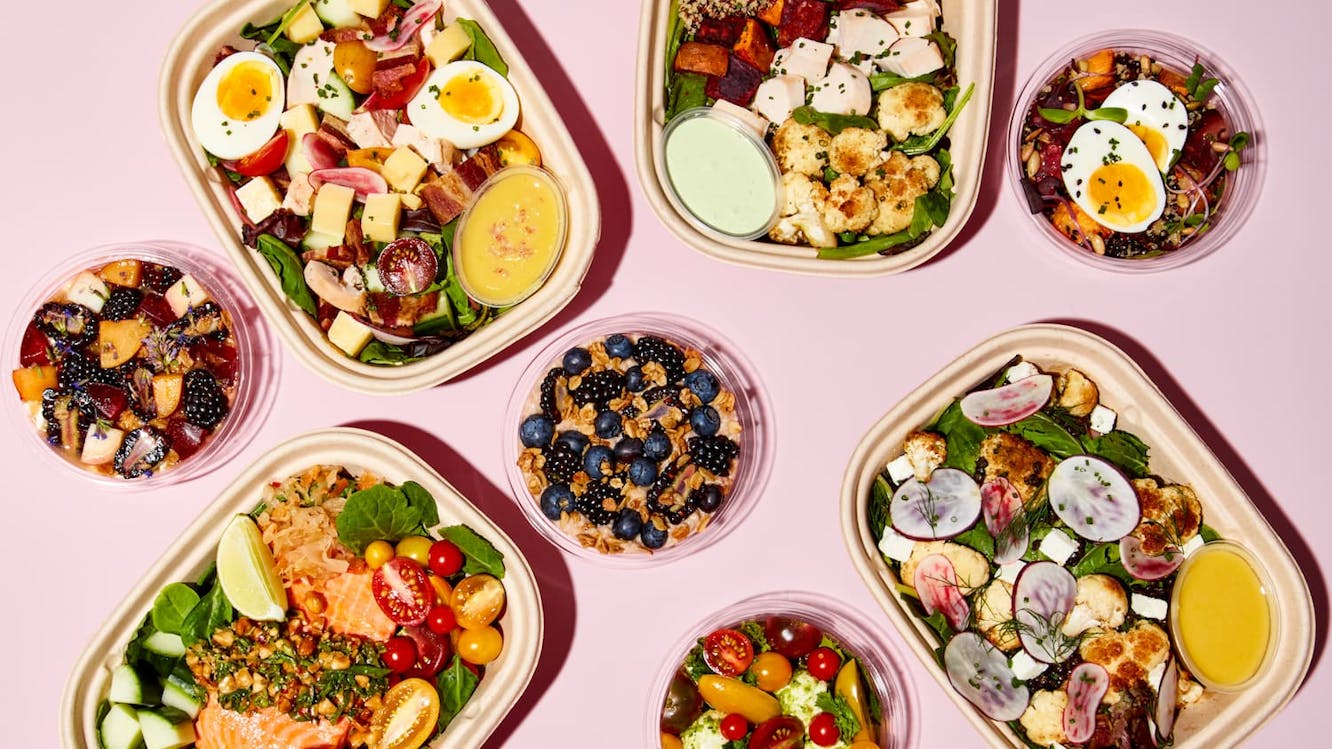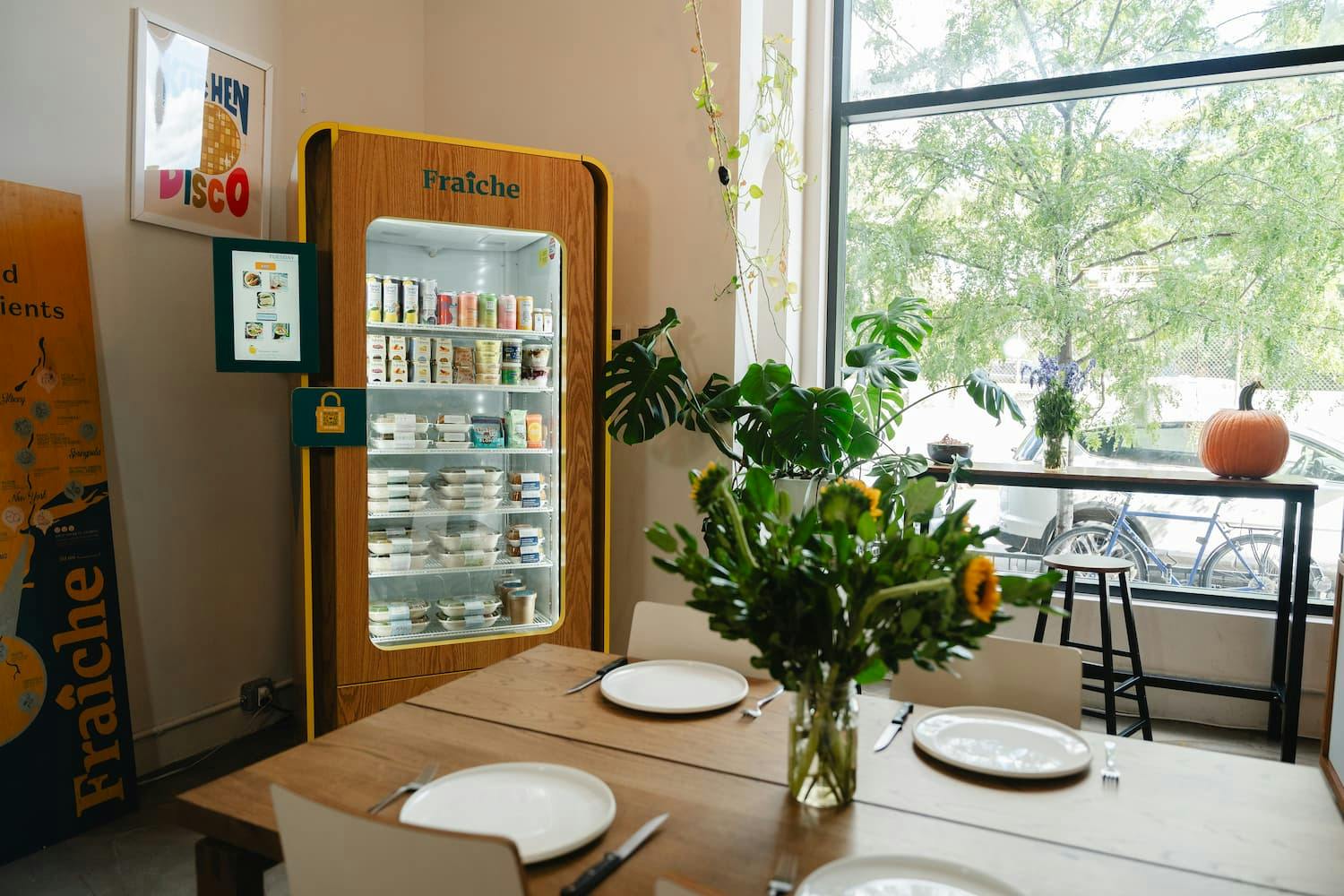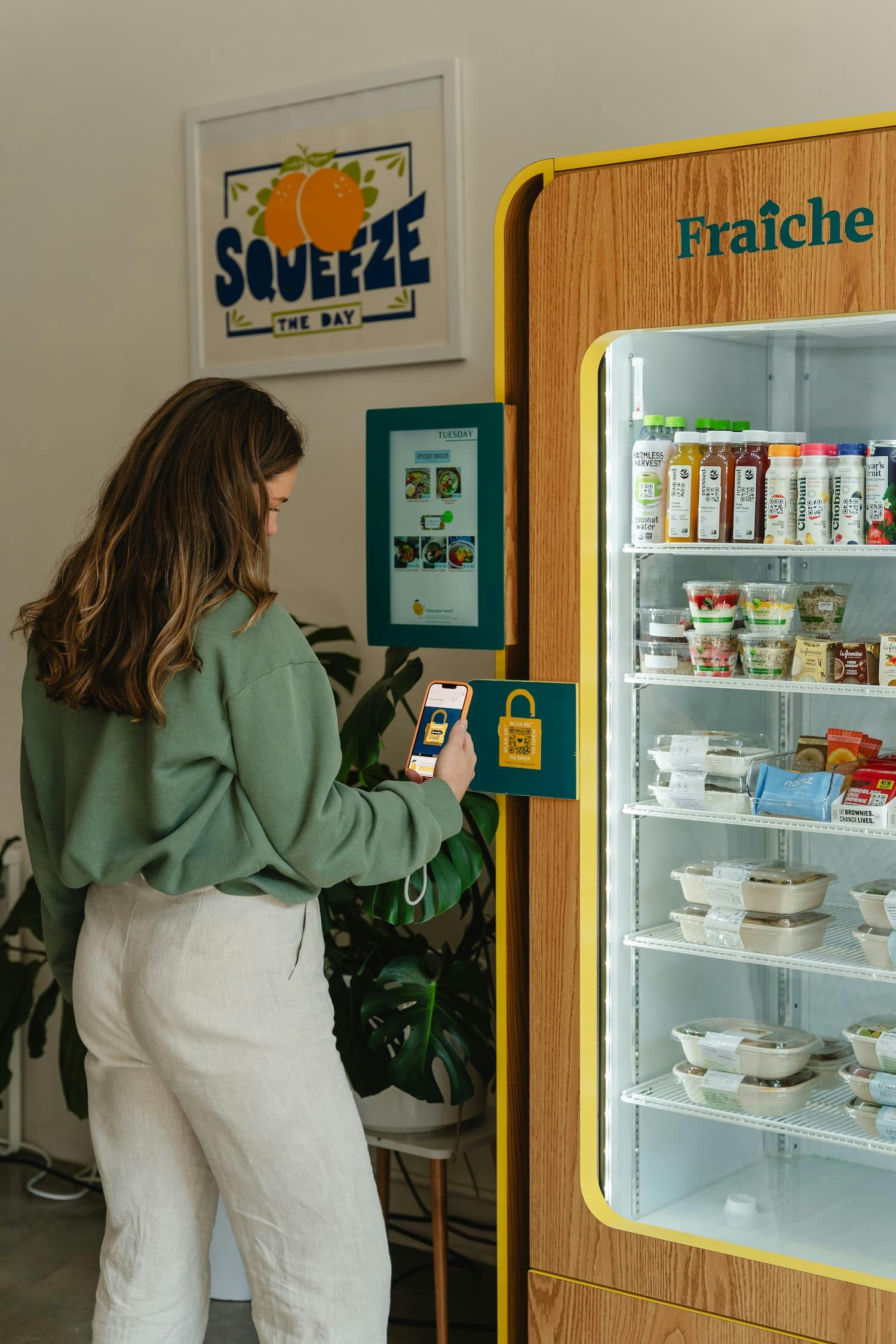Fraîche's Sustainability journey
"Every meal we eat is an opportunity to vote for the kind of world we want to live in. I’ve always believed that food is more than just sustenance. It's a universal language, a catalyst for community building, and a vehicle for cultural exchange. But beyond that, food is an integral part of our planet's ecosystem. Every bite we take leaves an imprint on the world - for better or worse." Tximista Lizarazu, CEO & Co-Founder at Fraîche.

2019
Date of creation
6
Number of employees
New York
Headquarters
Interview
Format
Let’s get to know you!
My name is Tximista Lizarazu, CEO & Co-Founder at Fraîche.
I'm originally from the Basque Country, a region steeped in rich gastronomical traditions. Growing up in the southwest of France with such an environment, I developed a deep respect and fascination for food, its sources, and its potential to build community. This led me to do a business school, move to New York and work in the food industry, and eventually found my own food-tech company.
My journey into sustainability was a natural progression, born out of my concern for the planet and my desire to make a difference. I was deeply troubled by the inefficiencies and environmental toll of the food industry. As I delved deeper, I realized that every meal we eat is an opportunity to vote for the kind of world we want to live in.
We built Fraîche with Julie, and the team with the mission to transform the in-office food experience while making a positive impact on our environment. We're committed to sourcing local and responsible brands, minimizing waste, and promoting a culture of conscious consumption, all that with green logistics. In a nutshell, my love for food, my experiences across the globe, and my commitment to sustainability converged to bring me where I am today - leading a company that nourishes people while nurturing our planet.

What was your inspiration behind Fraîche? And why tackle the climate crisis specifically through the food and beverage industry?
The inspiration for Fraîche came from a combination of my passion for food, my experiences in the NY food business, and my deep concern for the state of our planet. I've always believed that food is more than just sustenance. It's a universal language, a catalyst for community building, and a vehicle for cultural exchange. But beyond that, food is an integral part of our planet's ecosystem. Every bite we take leaves an imprint on the world - for better or worse.
The food and beverage industry is one of the largest contributors to global greenhouse gas emissions (30%). Food at work would be 1/3 of that, so 10% of the total. It's also a major driver of deforestation, water pollution, and biodiversity loss. At the same time, it's an industry riddled with inefficiencies - from food waste to overproduction. Yet, it's an industry with immense potential for positive change. By transforming how we grow, process, distribute, consume, and waste food, we can significantly reduce our environmental footprint and even help regenerate our planet's ecosystems. That's the power of sustainable food systems, and that's why we chose to tackle the climate crisis through this industry.
We founded Fraîche to demonstrate that we can enjoy delicious, nourishing food without harming our planet. By reimagining the in-office food experience, we aim to make sustainable eating the default choice - easy, enjoyable, and accessible to all.
Can you explain Fraîche's concept and how it can contribute to addressing the climate crisis?
Our value proposition for offices is clear: through Fraîche, companies gain an affordable, easy-to-implement food service that enhances employee satisfaction while reducing their carbon footprint. Our model, which doesn't require on-site kitchen facilities, makes us an efficient solution, easily scalable for companies of all sizes, and the most convenient solution on the market for employees. Plus, our efforts to educate and engage our consumers turn every meal into an experience – one that fosters awareness and ignites conversations about sustainability:
- Green Logistics: We leverage green logistics, using electric cargo bikes for delivering our meals. By delivering to 50-100 people simultaneously, we reduce our carbon emissions per delivery substantially compared to traditional delivery services.
- Partnership with Innovative Food Providers: We don’t just source ingredients - we form partnerships with local food businesses committed to sustainability. This way, we can offer diverse, high-quality meals while bolstering the local economy and promoting sustainable food practices.
- Zero Food Waste Policy: Our unique model allows us to accurately predict demand and minimize waste, with any unsold meals donated to local charities. This commitment to zero waste extends beyond just feeding our customers – it's about nourishing our community as well.
- Commitment to Responsible Packaging: We prioritize compostable packaging and are setting our sights on introducing reusable packaging by 2024. This aligns with our mission of reducing our environmental impact at every stage of the process.
- Inspiring Action Through Education and Engagement: We leverage every Fraîche meal as an opportunity for learning and engagement, fostering conversations about our food choices and their wider impact.
Further, we work closely with Greenly to analyze, reduce, and offset our carbon emissions. This holistic approach to sustainability makes us a greener option not just for our consumers but also for the environment.
At Fraîche, it's not just about providing food. It's about shaping a greener, more sustainable future for everyone, one meal at a time.

What do you consider to be the key problems in the US current food systems?
1. Unsustainable Agricultural Practices: A large proportion of US agriculture revolves around industrial farming methods that heavily rely on chemical fertilizers and pesticides. This not only degrades the quality of soil but also contributes to water pollution and biodiversity loss. Additionally, industrialized livestock farming has a significant environmental footprint and often overlooks animal welfare.
2. Food Waste: In the US, we face a serious issue with food waste. It's estimated that nearly 40% of the food supply is wasted. This represents an enormous waste of resources, including water, energy, and labor. Additionally, decomposing food waste in landfills generates methane, a potent greenhouse gas.
3. Nutritional Deficiencies and Health Concerns: Despite having one of the most abundant food supplies in the world, the US struggles with health issues tied to poor nutrition, including obesity, diabetes, and heart disease. These are often linked to diets high in processed foods and low in fresh produce and whole grains.
4. Lack of Transparency: Many consumers lack a clear understanding of where their food comes from and how it's produced. This disconnect makes it hard for people to make informed decisions about their food choices and the associated impacts on their health and the environment.
5. Inequalities in the Food System: The US food system often reinforces social and economic disparities. Farmers and food industry workers often work in challenging conditions for low pay. Moreover, access to fresh, nutritious food is not equal, leading to "food deserts" in lower-income communities.
At Fraîche, we're committed to addressing some of these challenges through more transparency, reduction of food waste, support of local / sustainable food businesses, and making wholesome, delicious meals more accessible. Our aim is to drive a significant shift in our food system, making it more sustainable, and health-focused.
What have been some of the most valuable lessons you've learned along the way, and how have they shaped your approach to creating a positive impact through food and consumption?
1. Impact Takes Time: One of the most valuable lessons I've learned is that meaningful, lasting change is a marathon, not a sprint. It requires patience, persistence, and a commitment to long-term goals, despite any short-term obstacles. The impact we're striving to make through Fraîche is substantial, aiming to transform the way businesses and individuals approach food. This transformation won't happen overnight, but every small step we take brings us closer to our vision of a more sustainable and equitable food system.
2. Perfection is a Process: It's important to remember that achieving sustainability is a journey, and it's okay not to be perfect from day one. Mistakes and setbacks are not failures, but opportunities to learn and improve. At Fraîche, we constantly learn, iterate, and innovate, embracing every challenge as a chance to refine our approach and advance our mission.
3. The Power of Community: I've recognized that our most significant influence comes from fostering a community united by a shared vision. By rallying consumers, partners, and employees who are as passionate about sustainable food as we are, we can enact change that extends beyond our individual efforts.
4. Importance of Accessibility: Sustainable options need to be as convenient and appealing as their less-sustainable counterparts to achieve widespread adoption. That's why we prioritize creating a service that not only champions the planet but also delights our customers with its quality and convenience.
5. Transparency Builds Trust: Our customers value honesty, and offering detailed information about our food sources, production methods, and environmental impact fosters trust. This transparency cultivates a strong relationship between Fraîche and our community.
6. Embrace Constant Learning: Sustainability is a complex, ever-evolving field. We remain open to new knowledge, technologies, and approaches, allowing us to continually enhance our sustainability practices and reduce our carbon footprint further.
These lessons serve as the guiding principles behind our operations at Fraîche, shaping our decisions, informing our strategies, and motivating our relentless pursuit for a more sustainable, health-focused food system.

Looking towards the future we know the many industries will be strongly impacted by the climate crisis. What key changes do you want to see in legislation/policy to accelerate a shift towards greener consumption behaviours choices?
1. Incentivize Regenerative Agriculture: Government subsidies should favor farming practices that restore rather than deplete our soils and biodiversity, fostering a more sustainable and resilient food system.
2. Internalize External Costs: Reflect the true cost of food production in pricing, accounting for environmental impacts, to shift consumer behavior towards more sustainable options.
3. Stricter Carbon Emission Standards: Governments need to hold businesses accountable for their carbon footprints by setting stricter emission standards and ensuring they are enforced.
4. Enforce Stronger Regulations on Packaging: Introduce more stringent regulations to reduce the use of non-reusable materials in packaging, and incentivize research into new, more sustainable materials and systems.
Any resources you'd recommend for other sustainability leaders— books, podcasts, videos?
- "Let My People Go Surfing: The Education of a Reluctant Businessman" by Yvon Chouinard: This book offers an insightful look at the philosophy of the founder of Patagonia Inc. Chouinard sets forth his belief that there's more to business than making money—namely, doing good and inspiring others.
- "The Third Plate: Field Notes on the Future of Food" by Dan Barber: A transformative perspective on our food culture that promotes sustainable agricultural practices and innovative cuisine, written by an award-winning chef.
- "Kiss the Ground": This full-length documentary narrated by Woody Harrelson showcases the transformative power of regenerative agriculture, an innovative solution to climate change.
- "Four Fish: The Future of the Last Wild Food" by Paul Greenberg: This book offers a compelling exploration of the global fish trade, with a focus on the imperative for sustainable fishing practices to safeguard both our oceans and our food supply.
Who is an environmental activist that inspires you today and why?
A young innovator who really inspires me is Boyan Slat, the founder of The Ocean Cleanup. At just 18, Slat developed a concept to remove plastic from the world's oceans, and instead of simply advocating for action, he took it upon himself to create a solution. What impresses me most about Slat is that he leads by example. He didn't wait for someone else to fix the problem—he stepped up and did something about it himself. And in doing so, he has shown the world that action speaks louder than words when it comes to addressing environmental challenges.